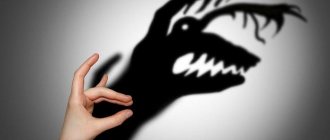Description of the pathology
Fear of failure is indeed most often born in childhood, and as a person grows up, the fear of doing something wrong remains, and the person does not know how to overcome it.
It is not always possible to receive a positive assessment of your work or actions. Sometimes you have to listen to criticism and fail. A confident and developed person copes with criticism and failures quickly enough.
Others only increase the fear of failure, trying to avoid such actions in the future. It turns out the following: having experienced failure in some matter, in order to overcome his fear, a person no longer takes up this matter. It comes to the point that making coffee for him is a serious task, in which the main thing is not to fail. That is, there is a complete isolation of a person from society and a pathological fear of failure.
Fear of mistakes is scientifically called atychiphobia. This is one of the most common phobias in the modern world. In psychology, it is customary to classify the fear of making a mistake as a social class of fears, since the fear of making a mistake is born and modified under the influence of society.
A person who is overcome by the fear of making a mistake may completely give up trying to do anything, since he will consider it unsuccessful in advance. In turn, a person who is afraid of making mistakes will gradually fall down the social ladder, since self-improvement and career growth scare her.
Reasons for fear of mistakes
Fear of error (scientific name atychiphobia) may at first glance seem to be a product of our time or the result of personal failure. Judge for yourself: society craves new achievements, sets limits for success, forces people to achieve something so quickly that a person is unable to realize his actions.
This structure of society can provoke many situations that traumatize the psyche. The most tender age for perception is childhood, and which of today’s children has not encountered an overly demanding teacher or parent? Hence the fear of doing something that will entail the censure of an authority figure.
More importantly, the fear of making mistakes has an evolutionary basis. It has not only conscious, but also unconscious reasons for its occurrence. During the formation of the human species, the fear of committing new, seemingly unsafe actions protected representatives of the genus Homo from injury and death.
Due to the imperfection of the instincts, fear, which once protected a person from flames and sharp teeth, became stronger in the subconscious and continued to work in a modern safe environment. The instinctive fear of performing unfamiliar actions responds equally well to both the likelihood of a real threat and an imaginary one.
A person who is afraid of making mistakes is forced to remain in the “comfort zone” and is deprived of the chance to develop unhindered, gain new experience and learn new skills. The fear of making a mistake narrows the range of possible actions of a person, forcing him to exist in a limited mental space. This can lead to personal stagnation or even degradation.
Causes of atychiphobia
Fear of embarrassment can be caused by completely different reasons. The predominant reason remains the person’s existing negative experience. Because of the fear of failure, a person projects the experience of one incident onto all of his possible experiences.
Some people experience that kind of fear of failure that they don’t even want to think about the possibility of trying something and starting something. This stereotypical form of thinking, as it seems to a person, protects him from mistakes. In fact, she prevents any movement in his life.
Fears of failure can also arise when an activity is assessed only by its effectiveness, without taking into account a person’s own rhythms and qualities. As a result of such a one-sided assessment, a specific label is assigned to the activity - failed or achieved success. There is nothing in between these two labels.
The reasons why people are afraid to do any activity can be:
- Connection with childhood fear, when in childhood the child was severely punished for any mistakes.
- The inability to make mistakes in a group, ridicule of any mistake - most often the inability to overcome fear arises in a group of teenagers, at school or college.
- Many fears are also driven by social fears imposed by the environment - a person begins to fear that if he is worse than others, he will be rejected.
We are looking for the culprit
The reasons for the fear of making mistakes lie on a variety of levels.
We can look back to childhood and find many examples of how we were rejected for failures, how demands were made to be loved and accepted, how little successes were ignored.
If we grew up in conditions where a mistake did not mean an opportunity to improve our performance, but personal degradation, where mistakes were equated with an unsurvivable catastrophe, we carry this bitter experience into adulthood.
And then it begins to seem to us that any mistake does not mean that we missed something, but shows that we ourselves are insignificant and are not capable of anything. It seems to highlight our inadequacy. Of course, you want to stay away from such situations. And the ideal and most effective way to avoid mistakes is to do nothing at all.
On the other hand, in our experience there may be examples of failures, the consequences of which were very difficult for us. Losing a huge amount of money after bankruptcy, choosing an inadequate partner, and even inattention to food, after which we had a fun night - all this can give rise to the fear of repeating such difficult situations.
Who is susceptible to the fear of making mistakes:
- Perfectionists This is all of us - who like to do everything perfectly and perfectly (or not do it at all). Who does not tolerate other people's weaknesses. Who treats themselves strictly and critically. And because of this, he lives in a cage of conditions and torment, because he can neither relax nor be spontaneous. Just work and achieve. No right to fail.
- Those who have experienced severe stress If your business once went bankrupt, worries about this will accompany you for a very long time. The same applies to many other situations that we fear.
- People with hypercontrol When it seems to us that everything depends on us, that we can influence every outcome of an enterprise, this gives rise to the illusion of omnipotence. And this also plunges you into an abyss of shame and guilt if suddenly something doesn’t work out.
- Unconfident Insufficient self-confidence and lack of reliance on internal resources leads to the fact that we avoid dangerous situations, great responsibility, interesting and complex tasks.
Manifestations of Fear
Atychiphobia is expressed in quite a few different ways. What is characteristic of fear in this pathology can be described as follows:
- Self-isolation - a person is afraid to participate in any events, especially public ones, closing himself in his comfort zone.
- Self-sabotage - fearing that he will do something wrong, a person subconsciously undermines his strength and efforts.
- Immobility - in order not to do something wrong, a person decides to do absolutely nothing and not strive for anything.
- Lack of self-confidence - fearing to make a mistake, a person assures himself that all the things he has done and the knowledge he has acquired are worthless.
- Perfectionism is the desire to be the best in everything and always hold a leadership position, the desire to work only in the area in which a person is completely confident.
Fear of mistakes
Our whole life is woven from contradictions; we make various choices every day: from the simplest to the most complex and serious.
For example: what to prefer for breakfast - tea or coffee, what clothes to wear today, how to spend the weekend - lying on the couch in front of the TV or going to visit, which friends to invite to a party. There are also more significant choices: what profession to choose, in which area to buy housing, which of the “candidates” to choose as a life partner, etc. and so on.
As you understand, the chain of choices is endless, and by preferring one of the options for something, we understand that we are giving up other options. Many of us easily make a choice, regardless of its consequences, because they (the consequences) will come or not come later. However, there are people who are unable to make even a basic choice; they are hampered by the obsessive thought of making a mistake in their choice, so it is unbearably difficult for them to make everyday choices. The selection process for such people drags on over time, because... The “possibility tree” of various choices becomes enormous. Simple comparisons of the pros and cons of different options don't work for these people. In the process of choosing, a person, with fear of making a choice error, begins to endlessly compare and weigh various options, trying to find the most rational of them. It is also possible that such a person will begin to shift the responsibility for choice, even in the simplest situation, to his loved ones, while continuing the thought process of choice within himself ad infinitum.
Why do people have this feature?
Here are some characteristics of people with choice-bias phobia:
- They have an idea of their life as a certain ideal trajectory of life movement.
- They are confident in the postulate “I can foresee events”
- They can mystify their possible mistake (for example, if I make a mistake, something terrible and irreparable will happen to my loved ones), thereby depriving themselves of the right to make a mistake.
When faced with the need to make a choice, a person plunges into endless rational reasoning; this process is based on the erroneous statement: “I can control my thoughts.” A person waits for his brain to run out of internal questions addressed to him, but they don’t end... Of course, this feature of a person, expressed in pathological doubts, complicates many aspects of his life, complicates everyday existence, building a career, building relationships in the family, with friends. Working with a professional psychologist can help show a person a different way of making decisions, that is, change the focus of perceiving the situation.
Life is not static, it is dynamic. Until a person makes any choice, he will not know whether he made a mistake in his choice or not. This situation has a certain analogy with driving a car - the driver first presses the gas pedal, and then controls the steering wheel and constantly “steers” so that the car moves in the desired direction.
Physical symptoms of the disease
Fear of failure is not just a mental manifestation. This pathology is also characterized by a number of physical conditions of a person. There is a rapid heartbeat, for example, when a person seems to be approaching the collapse of his affairs. Possible pain in the heart.
Due to panic fear, it is difficult to breathe, there is a burning sensation in the chest, shortness of breath, nausea and muscle spasms. Diarrhea is possible. Sometimes nervous excitability increases, while in some, on the contrary, stiffness and closedness are possible.
There is increased sweating, chills, and a feeling of heat or cold. In some cases, hallucinations are possible, more often auditory.
How to get rid of a phobia
This fear significantly reduces a person’s quality of life, interferes with his self-development and professional activities, personal life and networking. Therefore, assistance in advanced cases should be provided by a specialist.
- Don't be afraid to remember the moments when fear first appeared. It is necessary to analyze the reasons why this or that business did not take place. Even if the cause was inattention or another personal factor, you should not take too much responsibility on yourself.
- The cause of the pathology may be constant ignorance or unknown. To avoid this, you should have a solid theoretical basis before starting any business. Then possible risks will be significantly reduced.
- Learn to refuse if you feel that you cannot cope with any task. Don't take risks unless they are justified.
- Soberly assess the losses that are possible if the task assigned to you is not completed. Missed opportunities sometimes become much greater losses than the feeling of fear.
- Always have a backup plan. This way you will have a safety net that if things go wrong, you will be able to change it. For example, enlist the help of a friend or colleague.
- Be more decisive, any delay will only increase fear. Create a situation in which you cannot retreat.
- Finally, believe that failures happen to absolutely everyone. But the most rational thing is to use them as a springboard for further start and improvement of yourself.
Psychologists use methods of analysis and self-analysis to treat such fear, providing the patient with a thorough examination of the reasons why he considers any enterprise a failure.











